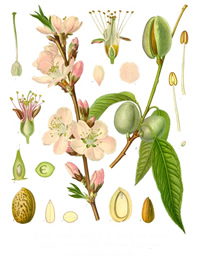Almond Prunus dulcis

- Common Names
- Almond Oil
- Botanical Name
- Prunus dulcis
- Family
- ROSACEAE
Medicinal Uses & Benefits of Almond Oil
![]() How to Use|
Side Effects |
Plant & Garden|
How to Use|
Side Effects |
Plant & Garden|
- Medicinal Uses: * Massage Oils
* Massage Oils
* Skin Care
- Properties: * Astringent * Emollient
- Parts Used: Almond kernal, expressed oil
- Constituents: essential fatty acids :oleic- 67.3%, palmitic- 5.0%,linoleic- 24%,linolenic- 0.2%,stearic- 2.3%
How to Use: Almond
Sweet almond oil is a favorite in aromatherapy as a carrier oil and is valued in natural skin care for it's ability to soften and condition the skin. Pale yellow in color, almond oil is expeller pressed from raw almond kernels. The oil contains glucosides, minerals and vitamins and is rich in protein. Almond oil is good for all skin types and helps to relieve dryness, itching and inflammation.
Almonds are a rich source of Vitamin E, and mono unsaturated fat, one of the two "good" fats responsible for lowering LDL cholesterol. Almond nuts are a healthy treat as is, or can be made into almond butter, a spread similar to peanut butter. The sweet almond contains practically no carbohydrates and can be made into flour for those on a low carbohydrate diet, suffering from diabetes, or by those who are looking for a gluten free flour.
Finely ground almonds also serve as an organic exfoliating ingredient in facial skin scrubs. The gentle abrasive action of the almonds helps to remove dead skin cells, and are the perfect natural replacement for facial soap.
Preparation Methods & Dosage :Almond oil is used as a skin care and aromatherapy carrier oil. Raw almonds are used in facial scrubs, and to make almond flour and almond butter.
Almond Remedies
Almond Side Effects: Exposure to extreme heat will lessen the shelf life of almond oil
Plant Description

There are two forms of the plant, one (often with white flowers) producing sweet almonds, and the other (often with pink flowers) producing bitter almonds. The almond belongs to the same family of plants as the rose, plum, cherry and peach. Sicily and Southern Italy are the chief Almond-producing countries.
Regional Traditions :Middle East *











